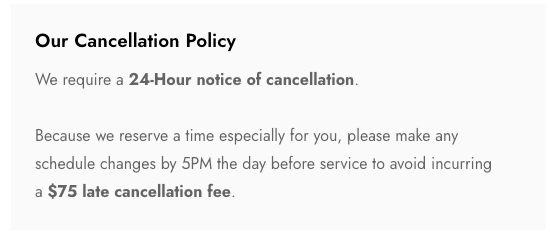How to Create a Cancellation Policy: Templates + Examples
If you don’t have a company cancellation in place, a few missed appointments could end up being costly for your business.
Thankfully, making your own company cancellation policy is easy. Find ready-to-use templates and learn how to get started in this guide.
Company cancellation policy template
To help you get started, we’ve created three different company cancellation policy templates for you to use. Add these to your own quotes, estimates, website, and contracts.
Short and sweet company cancellation policy template
Cancellation Policy – [Company Name]
Cancellations made [48 hours] or less before an appointment will be subject to a [rebooking fee of $50].
Cancellations made via [email to [email protected]] sooner than [48 hours] before an appointment will be processed without penalty.
Simple and straightforward company cancellation policy template
Cancellation Policy – [Company Name]
Please be advised that cancellations made up to [48 hours] before a scheduled appointment via [email, text, phone call] will be processed without a penalty.
Cancellations made [48 hours] or less before an appointment will be subject to a charge of [half of the service rate]. This includes appointments where our service provider is unable to access the property, is turned away, or the client is a no-show.
If [Company Name] cancels an appointment with less than [48 hours notice], a new appointment will be scheduled without penalty to the client, subject to availability.
Direct and detailed company cancellation policy template
Cancellation Policy – [Company Name]
Please note that once you have booked an appointment with us it means that we have reserved time in our schedule exclusively for you. If you cancel your appointment less than [24 hours] before it is scheduled to take place, you will be subject to a [penalty/fee/rebooking charge of $__ ].
To avoid a cancellation fee, please provide cancellation notice at least [24 hours] prior to your appointment.
You can cancel or reschedule an appointment by emailing us at [[email protected]], texting [xxx-xxx-xxxx], or calling our office at [xxx-xxx-xxxx].
Company cancellation policy example
MIL-SPEC Landscaping
MIL-SPEC Landscaping includes their cancellation policy as part of their terms and conditions on their company website.

Boardwalk Cleaning Co.
Boardwalk Cleaning Co’s cancellation policy is short and sweet and listed on their company’s terms of service web page.

3. Cancellation policy on a quote example
You can also include your cancellation policy in the notes section at the bottom of your service quote. Here’s what that looks like.

4 company cancellation policy must-haves
The purpose of a company cancellation policy is to limit when, how, and why a client can cancel an appointment or service without penalty.
To clearly communicate this information, every cancellation policy template should include these key elements:
1. A timeframe to cancel a service with or without penalty
How long do you want to give the client to cancel without penalty and when does the penalty kick in? 24 to 48-hour notice periods are the most common.
2. A late cancellation penalty
Are you going to charge a standard rebooking fee, a percentage of the cost of the service, or something else? Include in your cancellation policy exactly what your client will have to pay when they cancel their appointment last minute, whether it’s a specific fee or a percentage of the job.
3. Contact information for cancellations
How should a client contact you to cancel an appointment? Let them know which contact method you accept and how to get in touch by including the email address or phone number you want them to use.
4. A place for a signature
Before you can charge a client a late fee, they have to accept your policy. Include your company cancellation policy on estimates, quotes, and contracts so that a client can review it and acknowledge it with a signature.
You can also watch our video on how to make a cancellation policy, and get expert tips from landscaper Michael Bedell of Bedell Property Management:
When to send a company cancellation policy to a client
You should always send your cancellation policy before the job takes place, when you tell your client how much the work will cost.
Provide your company cancellation policy to:
- New clients via estimates, quotes, or contracts
- Existing clients when they book a new appointment with you
- Any ongoing clients if the policy is applicable to them
Pro tip: Always highlight any changes to your cancellation policy so your existing clients aren’t taken off guard with a surprise fee if they cancel outside of the cancellation window.
When to charge a cancellation fee
As per your business cancellation policy, you should charge a cancellation fee when:
- A client cancels an appointment outside of the cancellation period
- You are unable to access the property
- A client is a no-show
But, not every appointment cancellation deserves a fee. Don’t charge a cancellation fee:
- To clients who have not been made aware of your new policy
- For jobs that were canceled before your cancellation policy was in place
- To clients who canceled an appointment within your cancellation guidelines
- If your client is genuinely sick or has a genuine emergency
How to prevent cancellations
The best way to avoid cancellations is to get ahead of them. Prevent last-minute cancellations by:
- Creating an appointment reminder template to send out via email or text
- Using service reminder software to automate appointment reminders for each job
- Setting up appointment confirmation emails to send to your clients
By staying on top of cancellations before they become a problem, you’ll benefit from a fuller work schedule and more profit for your service business.
Originally published in March 2022. Last updated on June 16th, 2023.